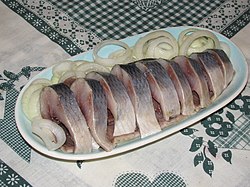
Back Marineret sild Danish Bismarckhering German Harengs marinés French דג מלוח (מאכל) HE Kryddsíld Icelandic Herring acar JV Zure haring Dutch Sursild NB Śledź marynowany Bismarck Polish Arenque curado Portuguese

Pickled herring is a traditional way of preserving herring as food by pickling or curing.
Most cured herring uses a two-step curing process: it is first cured with salt to extract water; then the salt is removed and the herring is brined in a vinegar, salt, and sugar solution, often with peppercorn, bay leaves, raw onions, and so on. Additional flavourings include sherry, mustard and dill, while other non-traditional ingredients have also begun being included in recent years.
Pickled herring remains a popular food or ingredient to dishes in many parts of Europe including Scandinavia, Great Britain, the Baltic, Eastern and Central Europe, as well as the Netherlands. It is also popular in parts of Canada such as British Columbia and Newfoundland. It is also associated with Ashkenazi Jewish cuisine, becoming a staple at kiddushes and social gatherings. Pickled herring is one of the twelve dishes traditionally served at Christmas Eve in Russia, Poland, Lithuania, and Ukraine. Pickled herring is also eaten at the stroke of midnight on New Year's Eve to symbolize a prosperous New Year in Poland, the Czech Republic, Germany, and parts of Scandinavia.[1]
- ^ "Lucky Foods for the New Year". Smithsonian.com. Retrieved 2019-10-18.